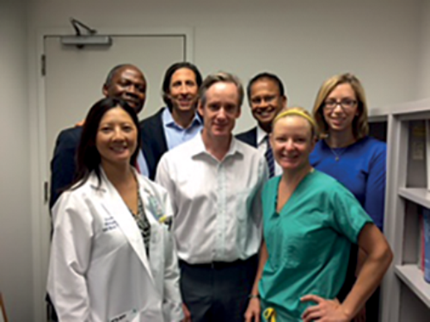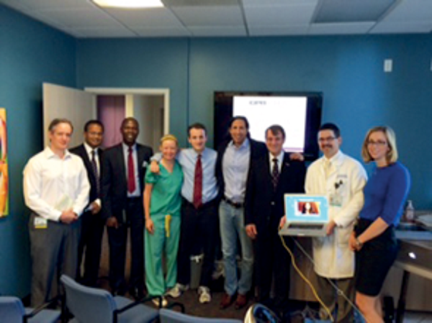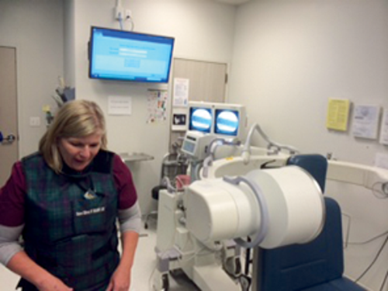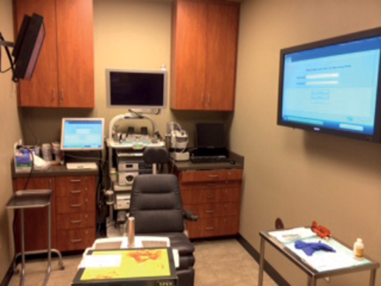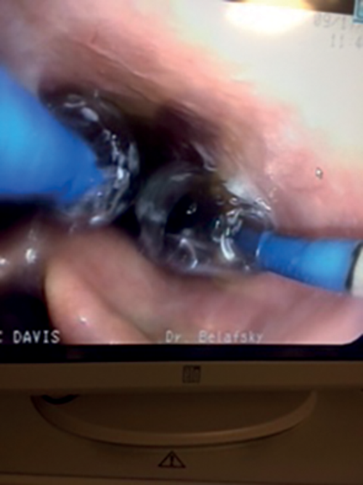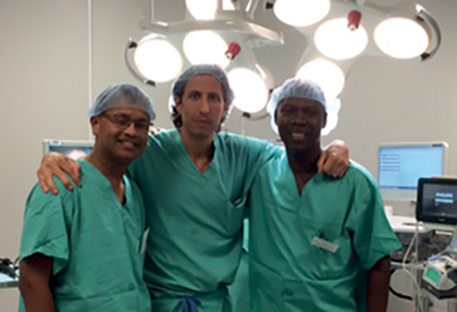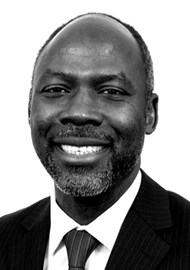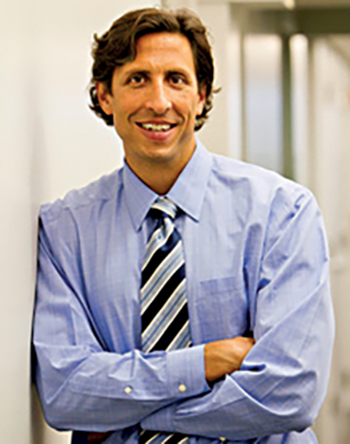
Dr Peter Belafsky.
Peter – tell us about your background
I was born in Philadelphia and went on to study at Vassar College which is a small liberal arts school in upstate New York. I then attended Medical School in New Orleans at Tulane University where I received a combined Medical and Masters in Public Health Degree in Epidemiology and Biostatistics. I then completed a PhD and entered residency in otolaryngology/head and neck surgery at Tulane. When I was a full time otolaryngology resident, I was also a full time professor in the school of public health teaching epidemiology in the evenings. I completed a fellowship in laryngology and broncho-oesophagology at Wake Forest University with Drs Jamie Koufman and Gregory Postma.
When I moved to San Diego in 2001, I was director and founder of the Voice and Swallowing Center at Scripps Memorial Hospital. After three years, I was recruited to be the Director of the Voice and Swallowing Centre at UC Davis, where I have resided for the past 10 years. I am currently a tenured Professor of Otolaryngology and Director of the Voice & Swallowing Centre. I am also a Professor at the UC Davis School of Veterinary Medicine, where we do research and advanced clinical care of animals, mostly dogs with swallowing problems.
How did you choose to focus on swallowing pathology?
I love to eat! I had an exceptional mentor in New Orleans, a professor and surgeon scientist named Francis Lejeune who was one of the innovators in laryngology of his time. His passion and clinical expertise was a tremendous influence and is what stimulated my initial interest in laryngology. My father is a retired otolaryngologist and was in practice with his brother for 30 years. While I always thought I would go back into practice with my father and uncle, my influence from Dr Lejeune and my fellowship directors and my passion for public health and epidemiology drew me towards an academic career.
We have seen your clinic first hand and can attest to the high clinical volume. How do you balance such clinical demands with a highly productive research laboratory?
We have been very fortunate to have a supportive department Chair and Dean. We have been able to establish a world class, first of its kind, integrated aerodigestive tract team, which has allowed us to change the way that swallowing problems are addressed from bench to bedside. Our team includes members from the UC Davis Center for Voice and Swallowing, Institute for Regenerative Cures, the School of Veterinary Medicine, and the Center for Health and Environment. The group (human and veterinary physicians and surgeons, basic and clinical scientists, nutritionists, grant writers, doctoral and post-doctoral students, speech and language pathologists, and human and veterinary medical students and fellows) all work together towards the common goal of improving the aerodigestive health and well-being of all living things. We realised very early on in our care of patients with complex airway and swallowing problems that the status quo is not acceptable. We need to innovate. Patients are suffering and fighting to regain their dignity and quality of life. Few were paying attention and we felt it was our obligation to innovate, provide hope, and improve their mental and physical well being.
Traditionally, who has seen patients with complex swallowing disorders?
They may have been seen by a GI doctor, their oncologist, or some other clinician, but nobody really felt comfortable in managing their complex swallowing issues from lips to stomach.
Dysphagia team (top) and Dysphagia multiciplinary team (above) at UC Davis.
Video fluoroscopy room.
Are there other centres like yours in the States or is it something that you are trying to roll out?
There are very high quality dysphagia centres in the States and we are doing our best to develop international interest and expertise. There is a great need for clinicians who are interested in dysphagia. Speech pathologists are in the trenches and they realise the need to train passionate, knowledgeable, and empathetic dysphagia physicians and surgeons. The otolaryngologist is the most qualified clinician capable of taking care of complex swallowing disorders. Gastroenterologists cannot perform the surgical procedures on the pharynx and upper oesophagus; the radiologists, neurologists, and rehabilitation physicians are incapable of performing procedures as well. Oropharyngeal dysphagia is not within the realm of general surgery. The grandfather of oesophagology, Chevalier Jackson, was an otolaryngologist and we must firmly grasp the reins of comprehensive dysphagia care from lips to stomach.
Of the three phases of swallowing, two of them fall under otolaryngology: the oral and the pharyngeal phase.
I must respectfully disagree with you – all three phases of swallowing are within the scope of our care. Otolaryngology gave care of the oesophagus to the medical subspecialists when we did not grasp flexible oesophagoscopy. Otolaryngology is steadily regaining sovereignty as the primary oesophagologists.
How did your experience with trans-nasal oesophagoscopy start? Where are we going in the future with this technology?
It all started for me in my fellowship when we received the first prototype TNO (trans-nasal oesophagoscopy) endoscope. Since this time in 2001, we have performed over 6000 TNO procedures without any major complications. This is big news in the States where one of our television personalities just died during a sedated EGD (OGD). There is little reason for somebody to go under anaesthesia for a screening examination of the oesophagus.
The otolaryngologist first needs to have access to the equipment, whether they or the hospital purchase it; the clinician then needs to become proficient with doing the procedure and that may take 20 or 30 procedures. The clinician must then ensure accurate analysis and interpretation and learn to incorporate the procedure into routine patient care. Once they enhance their efficiency and incorporate TNO into their routine practice, the next step in the evolution is the introducing of procedures.
Can we do more than just screening endoscopy with TNO?
Yes – you can definitely expand the procedures that you are currently performing. The TNO endoscope is a universal pan-endoscope that allows us to perform pan-endoscopy and biopsy, botulinum toxin injection for oesophageal achalasia, tracheal and oesophageal dilation, and office based laser laryngoscopy and secondary TE punctures. With new injectable laryngeal implants we will be able to perform injection medialisation of the vocal folds through the TNO endoscope as well.
Do you think the development of advanced technology has helped advance our knowledge in the field of dysphagia?
Absolutely. Unsedated oesophagoscopy in the office has transformed the field of dysphagia and was the stepping stone that evolved the field of otolaryngology into a one-stop specialty for comprehensive dysphagia care.
“We feel it is our obligation to innovate and provide hope to the millions of people worldwide suffering from swallowing disorders.”
Tell us about the advantages of in-office, out-patient procedures.
This is a very exciting topic. Moving procedures from the operating room to the office saves lives by eliminating the risks of anaesthesia. There are also significant financial savings: you save the health system $5,000 per procedure by keeping patients out of the operating room. In addition, there are savings on patient costs because individuals are not missing an entire day of work for the anaesthetised procedure; furthermore, patients’ friends and significant others are also not missing a day of work transporting the patient to their visit. Thus, in addition to the enhanced safety and direct cost savings, we are saving society two lost work days by eliminating the general anaesthetic. Frequently physicians get reimbursed less for office-based procedures. The enlightened health care system should unequivocally reimburse physicians more to keep patients out of the operating room whenever possible.
ENT outpatient clinic.
Balloon dilatation via TNO.
How would you advise an aspiring clinician to develop a comprehensive dysphagia practice?
It starts with interest and passion. It is hard to dabble in dysphagia treatment and it takes a clinician who is committed to comprehensive interdisciplinary care. Clinicians must focus on the establishment of a comprehensive team that includes an otolaryngologist, speech language pathologist, and nutritionist. Most hospitals will have a radiology department which is all you need to perform fluoroscopy. That and some flexible endoscopes are all that is needed to start.
Will the gastroenterologists say you are taking their job?
We are not taking anyone’s job: our focus is on improving patient health and quality of life. The fact is that gastroenterologists account for less than 5% of research presented at the Dysphagia Research Society and radiology contribution is less than 1%. We wish other specialties were more involved and have instituted initiatives to encourage GI, radiology, neurology, and rehabilitation medicine interest in deglutition.
What sort of patients would you refer to the gastroenterologists?
For ablation of Barrett’s oesophagus and dysplasia (which we see a lot) and endoscopic esophageal ultrasound.
The British Laryngological Association (BLA) was set up in 2012, whereas the American Laryngological Association (ALA) was established in 1879, so we have some catching up to do… How would you suggest that we develop our society?
All you need is a passionate group of members and leaders, which you are in no short supply of. There are many different aspects of our specialty. You could spend your whole career focusing on neurolaryngology, or swallowing, or airway disorders. It is difficult to be a super-specialist in all aspects of laryngology. The common gateway is the larynx. We must unite at this gateway and spread out from this vantage point.
L to R: Sam, Peter and Yakubu at UC Davies.
What is your next big adventure?
That is quite a question. Our next big move is stem cells. Regenerative medicine is the future of health care. We were just looking at our data today from our most recent mouse experiments and it is just amazing. Cell therapy will change the face of medicine and surgery. We live in exciting times.
What do you like doing after all this hard work?
I like to watch my kids’ soccer games. Americans are getting better, so you better take notice J.
Well thank you very much Peter, we really appreciate your time
The pleasure was all mine…
Dr Belafsky is Professor of Otolaryngology and the Director of the Center for Voice and Swallowing. He also holds appointments in the UCD Department of Epidemiology and School of Veterinary Medicine. His primary clinical interests are the comprehensive diagnosis and management of voice, swallowing and airway disorders. He has dedicated his career to the care of individuals with devastating swallowing conditions and is currently working on exciting and new advances in the treatment of dysphagia. He can be reached at pbelafsky@gmail.com
Declaration of Competing Interests: None declared.
Interviewed by Dr Yakubu Karagama and Dr Sam Majumdar.

